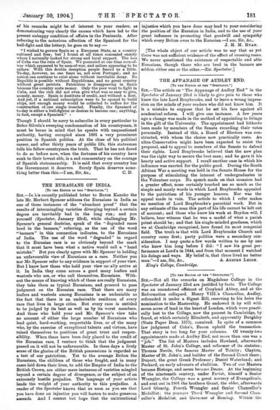THE APPANAGE OF AUDLEY END.
[To THE EDITOR OF THE "SPECTATOP.."
SIR,—The article on The Appanage of Audley End" in the Spectator of January 23rd is likely to give pain to those who knew the late Lord Braybrooke, and to leave a wrong impres- sion on the minds of your readers who did not know him. It is a mistake to suppose that he set his face against all academical reform. I will give one instance. A few years ago a change was made in the method of appointing to livings in the gift of the University. The appointment had hitherto been made by members of the Senate recording their votes personally. Instead of this, a Board of Electors was con- structed, with whom the choice now practically rests. An ultra-Conservative might have been expected to resist the proposal, and to appeal to members of the Senate to defend their rights. Lord Braybrooke believed that the new plan was the right way to secure the best man ; and he gave it his hearty and active support. I recall another case in which his influence was exerted for the public good. During the South African War a meeting was held in the Senate House for the purpose of stimulating the interest of undergraduates in the Volunteer corps. No speech made on that occasion had a greater effect, none certainly touched me so much as the simple and manly words in which Lord Braybrooke appealed to the patriotism of his younger hearers. Nor was the appeal made in vain. The article to which I refer makes no mention of Lord Braybrooke's parochial work. But in any estimate of the man this part of his life cannot be left out of account ; and those who knew his work at Heydon will, I believe, bear witness that he was a model of what a parish priest should be ; and that his single-minded goodness, which we at Cambridge recognised, here found its most congenial field. The truth is that with Lord Braybrooke Church and country came first ; party politics were a secondary con- sideration. I may quote a few words written to me by one who knew him long before I did: "I saw his great per- fermaaace at Lord's in 1844, and from that moment I watched his doings and ways. My belief is, that there lived no better






















































 Previous page
Previous page